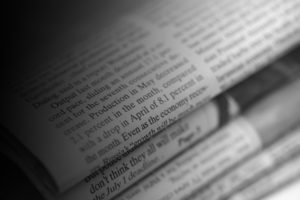There once was a time — and it wasn’t that long ago — when newspaper editors’ opinions were of some value, that others actually sought them out.
I got to play the part of a media “expert,” but I use the term loosely, as in quite loosely.
The 2008 presidential campaigned exposed me to the marvels of radio editing and the magic that radio hands perform with raw audio “copy.”
National Public Radio was looking for two newspaper editors who plied their craft in politically disparate parts of the country. They settled on Kevin Riley, editor of the Dayton (Ohio) Daily News and, um, yours truly . . . me!
Dayton is a heavily unionized community in southern Ohio. In 2008 it was considered to be part of the electoral “battleground” where U.S. Sens. Barack Obama and John McCain were fighting in their quest to become the next president of the United States. Riley was editor of the paper. I don’t know the fellow.
I was editorial page editor of the Amarillo Globe-News, deep in the heart of McCain Country. There wouldn’t be any fight in the Texas Panhandle over voters’ preferences. Our readers were solidly behind Sen. McCain.
NPR wanted to talk to the two of us to get our take on how our communities viewed the upcoming election.
I showed up at the High Plains Public Radio studio in downtown Amarillo, got comfortable sitting amid all this radio equipment. My good friend Mark Haslett — who worked for HPPR at the time — set up the studio nicely. The call came from NPR, I introduced myself to Liane Hansen, the NPR host, and to Riley, who was on the other end of the line in Dayton.
We chatted for about 30 minutes or so. I was terribly nervous, more so than Riley; at least that’s how I figured it, given that he stammered and stuttered far less than I did when he was answering questions from Hansen.
The bottom line was that Riley said the race in Ohio between Obama and McCain would be tight; meanwhile, I told NPR that McCain was likely to win the contest in the High Plains of Texas, Oklahoma, New Mexico and Kansas in a walk.
NPR boiled the interview down to about a 4-minute presentation on its “Morning Edition” broadcast on Sunday.
Here’s the most astounding part of it: NPR’s editing team made me sound much smarter and erudite than I am. They edited out the fits and starts, the “uhs” and “ums” and the occasional mangled sentence structure.
What’s more, they did it without changing any context! They broadcast my remarks completely and correctly, but without the mess I made of it.
I tell you all this to make two points: First, given the decline in print journalism and the explosive growth in other forms of media, newspaper editors no longer are deemed to be as valuable a resource as they once were; I am proud to have taken part in that discussion. Second, National Public Radio comprises geniuses who are very good at what they do . . . and I was proud to be a part of NPR’s broadcast.
